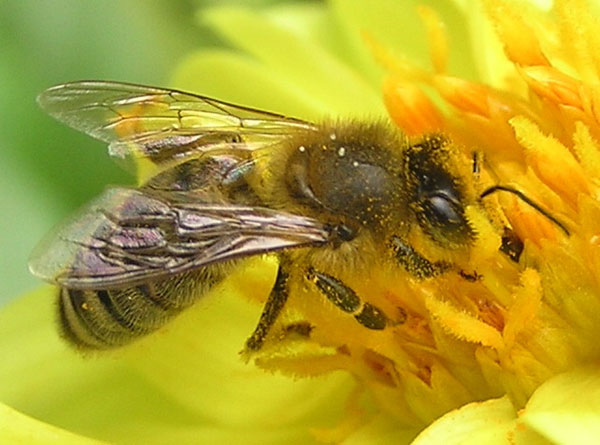Honey bees help find ways to recover a comatose patient
According to New Zealand scientists' findings, published in the Proceedings of the National Academy of Sciences (NASP), honey bees can be a clue for scientists to find therapies to help patients. General anesthesia surgery soon recovers the feeling of being stalled by the effects of anesthetic.
>>>Ability to neutralize toxic insecticides of honey bees
New research by scientists has found that patients who undergo general anesthesia surgery after waking up often feel "lagged" behind time, or feel as if they are living in a different time zone.
Researchers at the University of Auckland on April 17 said that general anesthesia has changed the function of genes that control the body's biological clock. The effects of general anesthesia have quickly moved patients to another sensory domain that makes them think they are living in another time zone and produce a sense of being dropped against the rhythm of time.

A bee is sucking honey
Dr. Guy Warman, from the Department of Anesthesiology and the university's Department of Biological Sciences, who also led the study, explains this in a scientific way as to why patients wake up later. Anesthesia surgery always feels like you've just experienced a few minutes. This type of impact can last for at least three days, even with the presence of strong light signals that show the brain the real time of the day.
In order to discover this interesting thing, scientists have studied the effects of general anesthesia on honey bees.
Honey bees are amazingly accurate in recognizing time, which allows them to find the right flowers at the right time of the day.
These bees are trained to move to a fixed food source before general anesthesia.
Scientists have closely watched their flight patterns after waking up from anesthesia and seeing how long their behavior for food is delayed. The results show that the awareness of these bees on time has decreased significantly.
Mr. Warman said: "By observing their behavior, we can clearly see the time of day that exists in the bees' brains and orient the effects of anesthesia."
Another advantage for scientists to easily compare is that the bee's biological clock works in a similar way to mammals.
By understanding why patients have such an expression, scientists can find therapies for them after anesthesia surgery and can completely improve their ability to recover quickly. surgery.
Researchers have now used their new findings in New Zealand clinical studies to test how "delaying" time is perceived in patients and finding treatments.
- Find out the 'secret' to make honey bees into queen bees
- Honey bees originated in Asia
- The secret of bees
- Honey bees forget their way to the nest because of pesticides
- Not only humans, bees are also stressed out for work
- The dance of honey bees is meaningless to those who neglect
- Crazy honey creates excitement like marijuana
- The world's first vaccine for honey bees
- How do honeybee clusters overcome the wind blows?
- Honey bees can enjoy pictures
- Video: Watch 30 giant bees massacred 30,000 honey bees
- Mushrooms can save bees
 Why do potatoes have eyes?
Why do potatoes have eyes? 'Tragedy' the world's largest carnivorous life: Death becomes ... public toilet
'Tragedy' the world's largest carnivorous life: Death becomes ... public toilet Tomatoes were once considered 'poisonous' for 200 years
Tomatoes were once considered 'poisonous' for 200 years Detecting microscopic parasites on human face
Detecting microscopic parasites on human face